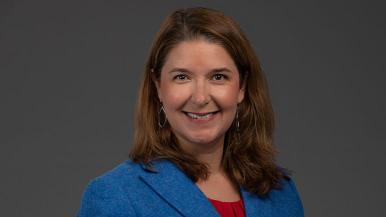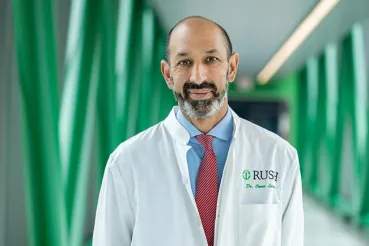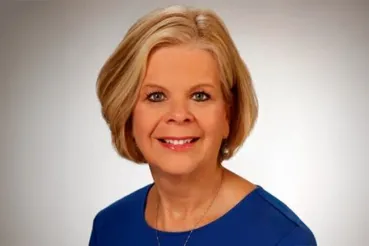Joanna Turner Bisgrove, MD, has more than an emotional connection to Rush University Medical Center. It's a family thing, too.
“I see RUSH green and the RUSH logo, and I just smile," says Bisgrove, an assistant professor in the Department of Family and Preventive Medicine. “The Department of Family Medicine and RUSH are home for me."
Her father, David Turner, MD, spent his entire career at RUSH, serving as the MRI section chief and then chairperson of the Department of Radiology.
“I spent my childhood at RUSH running around in the basement of the old hospital," she says. “I remember being here in the winter with my gloves attached to my jacket with those metal clips. When I got near the MRI, my gloves would stick straight out in the air because of the MRI's magnetic field."
Born with mild hearing loss, Bisgrove came to RUSH to visit her audiologist, David Klodd, PhD. When she was 9, Bisgrove got viral meningitis, which worsened the hearing loss in her left ear, and she ended up getting a hearing aid. And almost 13 years ago, Bisgrove got a hearing aid in her right ear.
The med student
While Bisgrove initially wanted to be an astronaut, growing up around doctors — including her father and grandfather — had an impact on her. But her dad never pushed her.
“My dad was kind of nudged into becoming a physician, and he didn't want that to be the case for me," she says.
After graduating from Cornell University with a degree in agricultural and biological engineering, she decided to go to medical school.
Bisgrove entered RUSH Medical College in 1999, nine years after the Americans with Disabilities Act became law. While there were some accommodations for people with disabilities, it was difficult to navigate and know how to use them.
Bisgrove worked on her own behalf to get what she needed, with support from Klodd. “RMC was wonderful in the sense that they were always open and accepting of what I needed, but the reality is that no one had any idea how to accommodate a student with a disability, and we had to teach them," she says.
“During the time I was in medical school, the idea of someone like me even training to be a doctor was a foreign concept, and the vast majority of medical schools would not have admitted me at all. RUSH was different even then, and this openness to diverse experiences laid the foundation for what RUSH is today."
Accommodations like using FM headsets allowed her to hear in the lecture halls. While helping Bisgrove try to figure out what she needed, Klodd's audiology students would study her accommodations to determine whether they were effective. The students' work helped Bisgrove when she was in the operating room. All of the surgeons wore a microphone for the assistive listening device so she could hear.
During medical school, she completed an Albert Schweitzer fellowship — in which she worked with fellow medical students to teach them about what English as a Second Language patients experienced in the exam room, and how to properly use interpreters. This wasn't universally accepted in the late 1990s and early 2000s. Bisgrove's fellowship also had her working in the deaf community, helping take care of deaf patients at Mount Sinai Hospital.
The advocate
After her residency in family medicine at MacNeal Memorial Hospital and McGaw Medical Center of Northwestern University, Bisgrove made her way to Wisconsin.
While in Wisconsin, Bisgrove became involved with the Wisconsin Academy of Family Physicians, where she was a co-chair of the group's legislative committee for eight years. In this role, she helped lead efforts to make medicine in the state better for physicians and patients, testifying on numerous occasions. In one effort, Bisgrove led testimony on the importance of simplifying the process by which patients are approved for medication; this helped set the stage for the bill to become law.
Bisgrove also testified against Wisconsin's 20-week abortion ban in 2015 and continued to fight for reproductive health access for Wisconsinites throughout her time as co-chair.
Her advocacy work in Wisconsin led to her receiving an American Medical Association Foundation Excellence in Medicine award this past June.
Even with all her work, Bisgrove knew that it was time to make a change. That change led her back to RUSH a year ago.
“I could see the writing on the wall in Wisconsin with what was coming with Roe V. Wade," she says. “They were just hammering stuff through."
Back at RUSH
“Coming back here to RUSH, to family medicine, it was a no-brainer," Bisgrove says. “It was like, 'How can we help you thrive?' There's so much passion and so many ideas. People are just so integrated."
Bisgrove realizes there's much work to be done, but she now feels inspired and invigorated because of the people in her orbit. She recently finished a four-year term on the AMA's Women Physicians Governing Council, where she served as vice chair this past year. On this council, she championed both gender equity initiatives and disability inclusion for physicians. She frequently testified in the AMA House of Delegates on both matters. At one point, her testimony helped stop an effort to weaken the AMA's support of the American with Disabilities Act.
“The goal of this council is to empower female doctors and provide pathways for them — give them more of a voice," says Bisgrove, who was elected to the AMA Council on Science and Public Health in June . “We're pushing for women's health and pushing for gender-accepting policies."
Her advocacy also extends to her new home with family medicine. Bisgrove is developing an advocacy curriculum for RUSH's new family medicine residency program. And she is also part of the Women's Leadership Council, RUSH's Disability Employee and Resource Group, RUSH's Health Equity Governance Committee and the new RUSH BMO Institute for Health Equity governance and policy subcommittee.
Bisgrove can't stress enough how amazing family medicine is at RUSH. “Our chair, Steven Rothschild, sets an incredible tone of inclusion and equity for all department members, and everyone believes wholeheartedly in this philosophy and mission," she says. “We center diversity, equity and inclusion in the care for our patients as well as how we work together. I really came home. It's been really good — RUSH, family medicine. It's been wonderful!"




